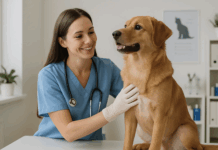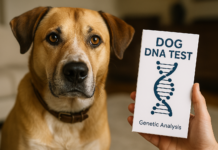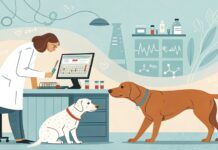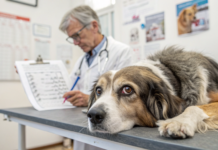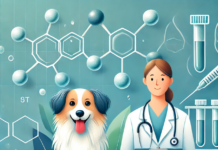Last Updated on April 11, 2024 by Dog Lover
Rabies Risk: Preventative Measures and Immediate Actions After a Dog Bite
Dog bites can be traumatic and carry the risk of rabies, a viral disease that can be fatal once symptoms appear. It affects the central nervous system, and understanding the risks and taking preventative measures and immediate action after a dog bite is crucial for your safety and health.
In Pittsburgh, where people and pets interact daily, it’s essential to be informed about rabies prevention and appropriate responses in case of a dog bite to ensure the best possible outcome.
If you or someone you know has been bitten by a dog, seeking legal help for dog bite victims in Pittsburgh can help deal with the aftermath of such incidents.
Legal professionals can guide medical treatment, potential compensation for injuries, and steps to take to ensure that responsible parties are held accountable, especially in cases where the risk of rabies adds complexity to the injury.
Understanding Rabies and Its Transmission
Rabies is a virus transmitted through the saliva of infected animals, typically entering the body through bites or scratches.
In regions where rabies is more common, dog bites pose a significant risk for transmission. The disease affects the brain and is nearly always fatal once symptoms have developed.
However, rabies is preventable through vaccination, both pre-exposure for pets and post-exposure for humans who have been bitten. Recognizing the signs of rabies in animals, including unusual aggression or lethargy, can help avoid potential exposure.
By taking preventive measures such as vaccinating pets and being cautious around stray animals, we can minimize the risk of rabies transmission and protect ourselves and our pets from this deadly disease.
Preventative Measures for Dog Owners and the Public
Rabies is a serious and deadly virus that can be transmitted through the saliva of infected animals. Responsible pet ownership is crucial to preventing rabies. Regular vaccinations are among the best ways to protect dogs and their owners.
Vaccinating your pets protects them and helps reduce the risk of transmission to humans. Vaccinating puppies and kittens at 12 weeks is recommended, followed by a booster shot at one year and every three years after that.
In addition to vaccination, educating the public about avoiding contact with unknown or wild animals and seeking immediate care after any animal bite are key strategies in rabies prevention. If you encounter a stray or wild animal, avoid any contact with them and do not attempt to feed or handle them.
If you are bitten or scratched by an animal, wash the wound thoroughly with soap and water and seek medical attention immediately. Even if you have been vaccinated against rabies, seeking medical care for any animal bite is vital.
Communities and health departments also play an essential role in preventing rabies. They often run vaccination programs and awareness campaigns to reduce the risk of rabies transmission.
Simple steps, such as keeping pets on a leash and reporting stray or unvaccinated animals, contribute significantly to public health efforts against rabies.
Working together can reduce the risk of rabies transmission and protect humans and animals from this deadly virus.
Immediate Steps Following a Dog Bite
Taking immediate and appropriate actions following a dog bite is essential to minimize the risk of rabies and other infections.
Here’s a step-by-step guide on what to do if you find yourself or someone else in this situation:
- Wash the Wound: Immediately clean the bite area with soap and water to remove as much saliva and bacteria as possible from the wound.
- Seek Medical Attention: Promptly visit a healthcare provider or an emergency room to have the bite assessed. This is crucial for all dog bites, regardless of their initial appearance.
- Rabies Post-Exposure Prophylaxis (PEP): Discuss with your healthcare provider whether you need rabies PEP. This series of vaccines is highly effective at preventing rabies if administered before symptoms appear.
- Assessment for PEP: The decision to administer PEP depends on various factors, such as the dog’s vaccination status, whether the bite was provoked or unprovoked, and the prevalence in the area.
- Err on the Side of Caution: Given the fatal nature of rabies, once symptoms develop, it’s always safer to consult a healthcare provider to evaluate the need for PEP after a dog bite.
The Importance of Reporting and Legal Considerations
Reporting the incident to local health authorities and animal control is an essential step in managing the risk of rabies. This allows for the monitoring or quarantine of the dog involved and helps prevent further incidents.
In situations where the dog’s owner is known, understanding your legal rights and options for compensation is crucial, mainly if negligence contributed to the incident.
Seeking experienced legal advice can ensure that medical expenses, including those for rabies treatment, are covered and that victims receive the support they need during recovery.
Role of Legal Assistance in Dog Bite Cases Involving Rabies Risk
Legal professionals specializing in dog bite cases play a vital role in advocating for victims, particularly in complex cases involving the risk of rabies.
They can manage the legal implications of the bite, including determining liability and pursuing compensation for medical treatment, pain and suffering, and any long-term care needs.
Experienced attorneys understand the medical urgency and emotional distress accompanying rabies risk, providing compassionate and comprehensive support to protect victims’ rights.
They work tirelessly to help their clients obtain the compensation they deserve and hold liable parties accountable for their actions. With their legal expertise and dedication to justice, dog bite attorneys can help victims move forward from the traumatic experience and focus on their recovery.
Moving Forward After a Rabies Scare
Recovering from a dog bite requires both physical healing and addressing the fear and anxiety associated with potential rabies exposure.
Victims can get support from healthcare providers, mental health professionals, and legal advocates to navigate this challenging time. Public education and community health initiatives are crucial in rabies prevention, aiming to minimize the risk of future incidents and ensure the safety and well-being of both the public and pets.
Dog bites carry risks beyond the immediate physical injury, with the potential for rabies exposure underscoring the importance of prompt and informed action.
Individuals can protect their health and legal rights by understanding the risks, taking preventative measures, and knowing how to respond if bitten.
In Pittsburgh, where the community and legal professionals work together to address and prevent such incidents, victims of dog bites have resources available to help manage the consequences and move forward.
Fact Check
We hope you enjoyed this article… What are your thoughts?
Pls feel free to share this article!



